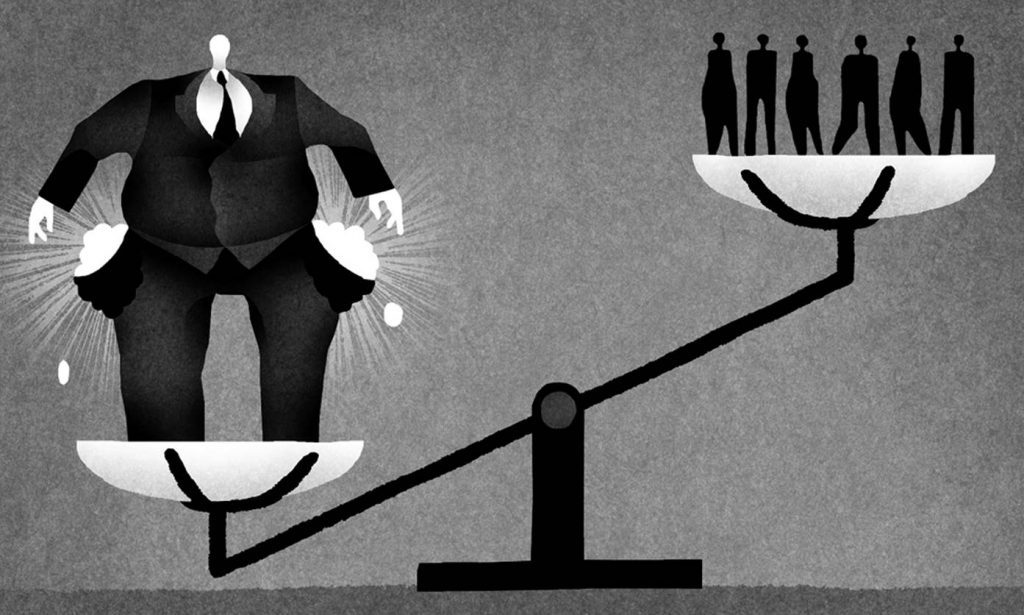
Shedding light upon the devastation caused by economic inequality
by Ella Searle
Although something which may appear directly attributable to contemporary capitalist practices, economic inequality can in fact be observed throughout the course of human history. There are continual examples of individuals possessing exceptional wealth, of which many exceed the current world’s wealthiest individual, Bill Gates, who has a fortune of $78.9 billion according to Time Magazine. Although many previous figures such as Mansa Musa of the 13th century (believed to be the wealthiest individual across human history) may have had larger fortunes than the current world leader, the current scale of economic inequality is at its highest rate in human history, with fewer and fewer individuals possessing larger and larger portions of global wealth. 8 people own as much wealth as 50% of the global population of 7.4 billion, according to Oxfam and 62 people now hold the same wealth as the bottom half of humanity, compared to 80 in 2014 and 388 in 2010 as found by Eoin Flaherty’s contributions within The Conversation. With such stubborn figures it is hard to ignore such an issue. Yet the issue of inequality is often brushed aside as leftist political argument, instead of focusing on global efforts to diminish the rates of poverty. What I aim to discuss is how scholars have in fact found that inequality is more harmful to affluent societies than poverty, and how this is much a greater deal than just statistical data; in fact it is a causation factor of significant social harm that is easily observable in our own society.
The presence of such notable social inequality in the developed world indicates how economic growth and increases in average incomes have ceased to contribute significantly to society’s wellbeing. The ground-breaking study of ‘The Spirit Level’ by William and Pickett shifted political thinking away from poverty, exemplifying that inequality was more damaging to richer societies, in turn incurring health and social problems across the poorest section of society. Furthermore, the study showed that it was not just the associated problems of ill health and violence that affected members of an un-equal society, rather a host of social problems are applicable, including infant mortality, life expectancy and social mobility. All of these issues contribute to the assumption that modern affluent societies are indeed social failures. The study found that the problem in rich societies is not of the wealth itself, rather the scale of material differences between different sections of society being too vast, and thus what is important is where we stand in relation to others in our own society. The pressures of inequality and wanting to keep up to societal standards are not confined to a minority of poor individuals; rather it is widespread within the population. Thus, the study emphasises how material inequalities within a society provide a framework around which class and cultural differences are formed, creating the cultural trappings of an upper and lower class. These findings can therefore be applied to our own society within the UK, and although a rich and developed nation, we often do not recognise the deep-seated effects of economic inequality.
Inequality is forecasted to rise ‘to record highs’ in 2020 within the United Kingdom with the current parliament being ‘the worst for living standards for the poorest of households since comparable records began’ according to The Guardian. Although for many money isn’t the most important factor in their lives, in our society income and wealth are closely related to whether individuals are able to achieve wider goals and outcomes. According to the National Enquiry Panel report, ‘households in the UK of the top tenth of society have a total wealth at 100 times that of the bottom tenth’, with ‘the large inequality growth between the late 1970s and early 1990s’ not being reversed. Yet what remains positive within the discussion of economic inequality is that there are some hints at reform, firstly being that of the admission of the devastating effects of inequality, as the matter has previously been seen as being less of a priority in political discussion. The NEP report was written due to ‘a back-drop of widespread public ignorance of the scale of inequality’ and in doing so hopes that more of a prominent discussion and active social policies are employed as a result. Other promising findings within the report are that of how the earnings between women and men and the educational results of different ethnic groups have both reduced. Thus, although often brushed over, what can be concluded on this brief examination of economic inequality is that change starts by an admission of a problem, in a widely rich and prosperous nation it can no longer be considered acceptable to simply brush such issues under the carpet; transparency and widespread discussion of such an issue is key.
Bibliography
Oxfam International. (2017) An Economy for the 99%, Oxfam Briefing Report
Wilkinson, Richard G. and Pickett, Kate, (2010) The Spirit Level: why equality is better for everyone, Penguin

0 Comments